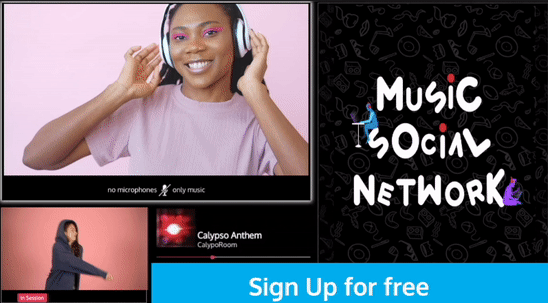Revolutionizing the music industry: DIY taking over (with data)
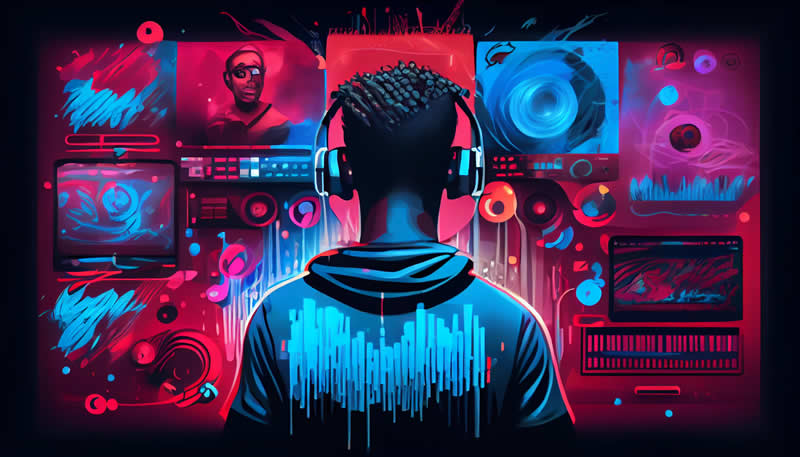
Major record companies have mostly dominated the creation and dissemination of music over the years, creating natural barriers to entry that were just impossible to overcome by independent music artists.
These record companies had the authority to choose which musicians to work with, how their music would be created, and how it would be made available to the general public, deciding basically everything from A to Z.
Yet, with the advent of technologies, the power structure in the music business has changed drastically in the last 5 to 10 years, and incredible scenarios are opening up in front of us with further developments brought in by artificial intelligence (AI).
More and more musicians these days are opting to record and distribute their music on their own, keeping the production and marketing aspects in their own hands without the need for help from external parties.
The development of inexpensive home recording hardware and software, as well as internet music distribution platforms that enable musicians to disseminate their music to a global audience without the need for a traditional record label, have all contributed to this trend.
Tools and techniques of DIY music production and distribution
DIY artists need to have access to the necessary equipment and know-how in order to successfully make and distribute music on their own without counting on third-party companies.
The following are some of the essential components that go into a DIY musician's toolkit.
Home recording equipment and software
One of the main benefits of DIY music production is the opportunity to record music in the comfort of your own home using home recording tools and software that were just not available to the masses some years ago.
To get this, musicians must invest money to buy and time to study top-notch recording tools like audio interfaces, mixing boards, and microphones, as well as software that enables them to edit and mix their recordings.
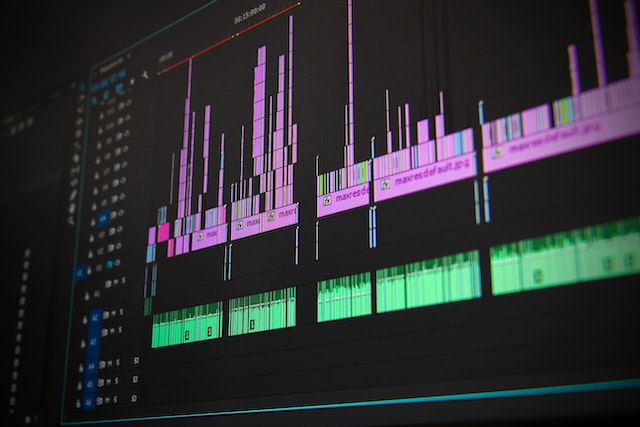
Online music distribution platforms
A DIY artist needs a mechanism to distribute their music after they have finished recording it, otherwise, all the hours and efforts spent writing, producing, recording, mixing, and mastering would be useless.
Artists nowadays can sell their music directly to listeners as well as distribute it to well-known streaming services like Spotify, Apple Music, and Amazon Music through online music distribution platforms like Bandcamp, DistroKid, and TuneCore for an annual fee depending on which platform they choose.
Social media and marketing strategies
It's critical for DIY musicians to have a strong social media presence and an efficient marketing plan because there are so many independent artists competing for listeners' attention that, without a proper marketing plan on platforms like Instagram, Twitter, TikTok, etc., the risk of going completely unnoticed is just too high.

A marketing plan is not an easy task to organize, as it is composed of several activities that need to be carried out in order to be successful in any industry.
Particularly in the music business, what really counts as well is your level of engagement with other artists, music influencers, and bloggers, cultivating with them valuable relationships over time.
DIY artists may develop their own fan base and music brand by employing these tools and methods instead of counting on the conventional music business gatekeepers like record labels and publishers.
Independently producing and distributing music may require more time and money, of course, but because of the creative freedom it offers and the possibility for higher financial benefits, many musicians find it to be a desirable course of action.
25% of artists earning $10K+ on Spotify are self-distributed
Lately, Spotify just released some interesting data that shows the number of songs that got over 1 million, 10 million, 100 million, and 1 billion plays.
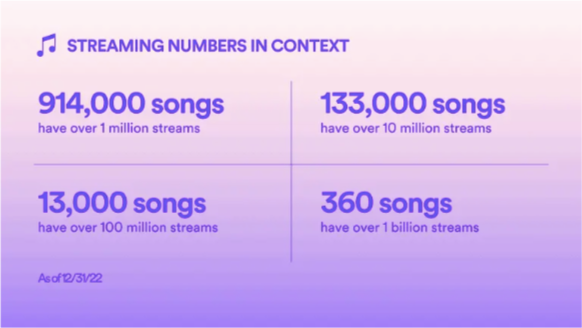
Photo credit: Spotify
Here is the cool part: “Many artists use distributors like DistroKid, TuneCore, CD Baby, or others to self-release their music on Spotify — and for more than ever before, it paid off.
A quarter of artists who reached $10,000 in earnings on Spotify released music through an artist distributor in 2022. These 14,700+ artists represent a 200% increase since 2017.”
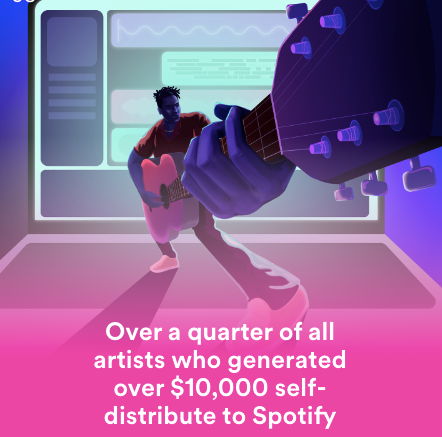
Photo credit: Spotify
DIY music now accounts for a quarter of Spotify streams
In February 2023, Spotify submitted its 20-F annual report form to the US authorities, providing more specific information about its operations.
The exciting part is that, in 2022, Spotify streaming accounted for over 75% of music licensed to the service from the three main labels and independent licensing firm Merlin. Meaning that the remaining 25% has been generated by DIY musicians.
We learned that this proportion has been continuously declining: 87% of Spotify's total streams in 2017 were from the big labels and Merlin; that percentage dropped to 85% in 2018; 82% in 2019; 78% in 2020; 77% in 2021; 75% in 2022.
The future of DIY music production and distribution
Thanks to the advancement of technology and increased accessibility, the future of DIY music production and distribution is bright, and the above data shows us just that.
New gear and software have made music creation more accessible and more economic for everybody, as aspiring artists now have access to tools they may not have previously had to create and release their music.
Independent musicians may now engage with their fans directly thanks to online venues like CalypsoRoom, where they are able to listen to their music face-to-face with their super fans.
A more democratic music business may be developed through the use of DIY methods for music production and distribution, as independent musicians are completely in charge of the promotion and distribution of their work.
This gives artists more control and fosters a more inclusive and varied music business.
Traditional record companies have been pushed to change and be more adaptable in their approach to signing and marketing musicians, and that’s as a consequence of the success of independent artists.
However, the market may become oversaturated as a result of DIY music creation and distribution, which makes it more difficult for independent musicians to stand out.
Independent musicians' capacity to produce top-notch music and engage a wider audience may be constrained by the lack of resources and knowledge at their disposal, and that’s the reason why going independent or choosing to sign with a record label will always have advantages and disadvantages that any artist needs to take into consideration.
Revolutionizing the music industry: DIY taking over - Conclusion
In conclusion, the growth of independent music production, distribution, and marketing is an encouraging trend that is revolutionizing the music business and all the parties that are part of it.
Even though there may be obstacles, the prospect of a more inclusive and varied music business is both promising and exciting.
DIY artists should continue to embrace new technologies and come up with innovative methods to create and distribute their music, like CalypsoRoom, while also looking to experts in the field for assistance when necessary.
With hard work and dedication, independent artists can continue to thrive in the DIY music industry, and CalypsoRoom is here to help when it comes to promoting your music and engaging with your audience in a new active way.
Thanks for reading,
CalypsoRoom Team
Frequently Asked Questions
What is DIY music production and distribution?
DIY (do-it-yourself) music production and distribution refers to the process by which independent musicians create and distribute their own music without the aid of traditional record companies. This might include producing the music, creating the album artwork, and disseminating the song online.
How has technology impacted the rise of DIY music production and distribution?
Technology developments have made it simpler and more economical for independent musicians to create and release their music. Anyone with a computer may now access software and equipment that was previously only available to professional studios.
What are the benefits of DIY music production and distribution for independent musicians?
Independent musicians have more influence over how their music is marketed and sold when it is produced and delivered themselves. Also, it opens doors for performers who previously would not have had access to conventional record labels.
What are some potential challenges for independent musicians in the DIY music industry?
Due to limitations brought on by a lack of knowledge and finances, independent artists may find it challenging to produce high-caliber music and appeal to a wider audience. DIY musicians should always look to experts in the field for advice and assistance.
How can independent musicians stand out in the DIY music industry?
Independent artists may differentiate themselves in the DIY music market by producing excellent music, developing a solid brand, and interacting with their audience on social media and other online channels. Increasing awareness and reach may also be accomplished by working with other artists and enlisting the aid of specialists in the field.
back
Written by CalypsoRoom Editorial Team
The CalypsoRoom Editorial Team is a skilled and diverse group of writers, researchers, and industry specialists who have access to Calypso's data and information in order to give you broad knowledge about the music industry as well as helpful advice to help you manage your music and dancing career.
Updated March 2023
Company number: 681223
James's Walk 31, Dublin, Ireland
contact@calypsoroom.com
+353 (89) 435 8928




